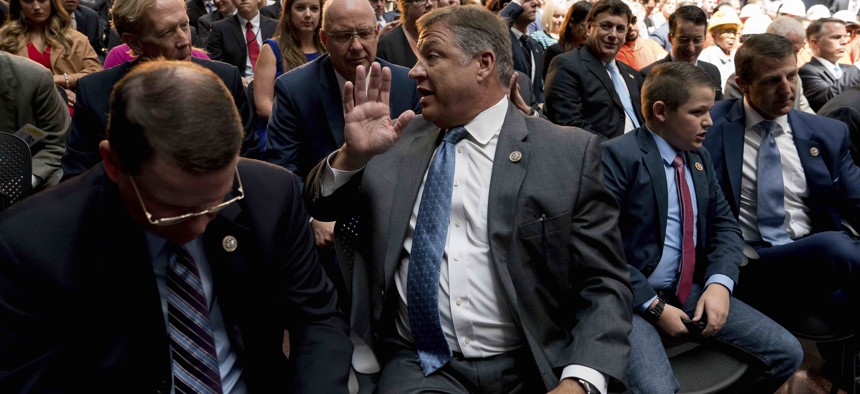Key GOP Lawmaker Releases Last-Ditch Infrastructure Plan

Rep. Bill Shuster, R-Pa., center, sits in the audience before president Donald Trump speaks at a roundtable on infrastructure at the Department of Transportation, Friday, June 9, 2017, in Washington. AP Photo/Andrew Harnik

Connecting state and local government leaders
U.S. Rep. Bill Shuster’s draft bill includes gasoline and diesel tax hikes.
The Republican chairman of the House Transportation and Infrastructure Committee released a draft public works bill on Monday that calls for phasing in a gas tax increase of 15 cents per gallon over three years, along with a raft of other measures.
For U.S. Rep. Bill Shuster, of Pennsylvania, who is not seeking reelection, the proposal amounts to a last ditch attempt during his final months in office to spark movement on an infrastructure package, after efforts to do so by the Trump administration lost steam.
In the long-term, parts of the bill are geared toward shifting how the U.S. pays for transportation infrastructure away from taxes on gasoline and diesel fuel, despite a nearer-term hike in those taxes.
“This discussion draft does not represent a complete and final infrastructure bill,” Shuster said in a statement. “It is meant to reignite discussions amongst my colleagues, and I urge all Members to be open-minded and willing to work together in considering real solutions.”
The proposal to increase the gas tax is likely to be one of the elements in his plan that garners the most attention. Following the phased-in increase, the tax would be indexed to rise with inflation. It would then drop to zero in 2028, as similar taxes on alternative fuels increase.
Diesel tax rates would follow the same trajectory as those for gasoline, but would rise by 20 cents per gallon over the three year phase-in.
Key Republicans in Congress have voiced skepticism and opposition in recent months about the prospect of raising fuel taxes.
Elsewhere in Shuster’s legislation, there is language that calls for establishing a Highway Trust Fund Commission to advise Congress on how to achieve long-term solvency for the financially troubled account, a main source for federal highway and transit spending.
In recent years, the Highway Trust Fund has had its finances weakened by eroding fuel tax collections, which provide its primary stream of revenue. Lawmakers have relied on transfers from other parts of the federal budget to help keep it afloat.
Currently the federal tax on gasoline is 18.4 cents per gallon, in line with its 1993 level. The tax on diesel is 24.4 cents per gallon. The taxes are not indexed to rise with inflation. And improved vehicle mileage and electric vehicles pose challenges for their viability in future years.
Shuster’s draft bill stipulates that the trust fund commission cannot recommend shoring up the long-term finances of the trust fund by relying on excise taxes on gas and diesel.
Documents released with the congressman's proposal cite Congressional Budget Office estimates indicating the trust fund could become insolvent as soon as 2020.
The draft legislation also proposes establishing a national pilot program to demonstrate whether a mileage-based user fee can replace gas and diesel taxes. Some states, such as Oregon, are already experimenting with pilot programs to test out these fees.
There are a number other proposals in the draft text to gin up new money for the Highway Trust Fund, such as eliminating a reduced tax rate on fuel used by certain intercity and local buses, and reinstating a 4.3-cent-per-gallon tax on diesel used by some passenger trains.
Other ways the bill aims to generate revenue include a 10 percent tax on the wholesale price of electric vehicle batteries and a 10 percent tax on the wholesale price of tires for adult bicycles.
On the grant-making front, the draft legislation calls for establishing a set-aside for “incentive grants” that would go to applicants that have leased assets to the private sector, and have shown that the proceeds from the lease will be used to make other infrastructure upgrades.
Shuster’s bill doesn’t only focus on transportation. It also dives into a range of programs related to water infrastructure.
For instance, the legislation would amend current law so states have to use at least 10 percent of the federal "capitalization" grants they receive for their Clean Water State Revolving Funds to assist communities with fewer than 10,000 people.
The revolving fund program offers low-cost loans and other financing assistance for wastewater utilities to complete projects.
There are also provisions in the draft bill to reauthorize the Water Infrastructure Finance and Innovation Act, or WIFIA, and to allow the Army Corps of Engineers to enter into an agreement with the Environmental Protection Agency to service loans for the Corps version of the program.
While EPA now has its WIFIA program up and running, the Corps has lagged getting its established. WIFIA involves the federal government lending directly for water projects at interest rates aligned with the typically low rates for U.S. Treasury debt.
There are a number of sections in the bill intended to speed up project approval processes as well, including environmental reviews.
A vision statement released with the bill concedes that it “does not attempt to solve every issue facing our infrastructure, nor does it pretend to provide all of the answers.”
Bill Lucia is a Senior Reporter for Government Executive's Route Fifty and is based in Washington, D.C.

NEXT STORY: Urban Broadband Needs Upgrading, Too





